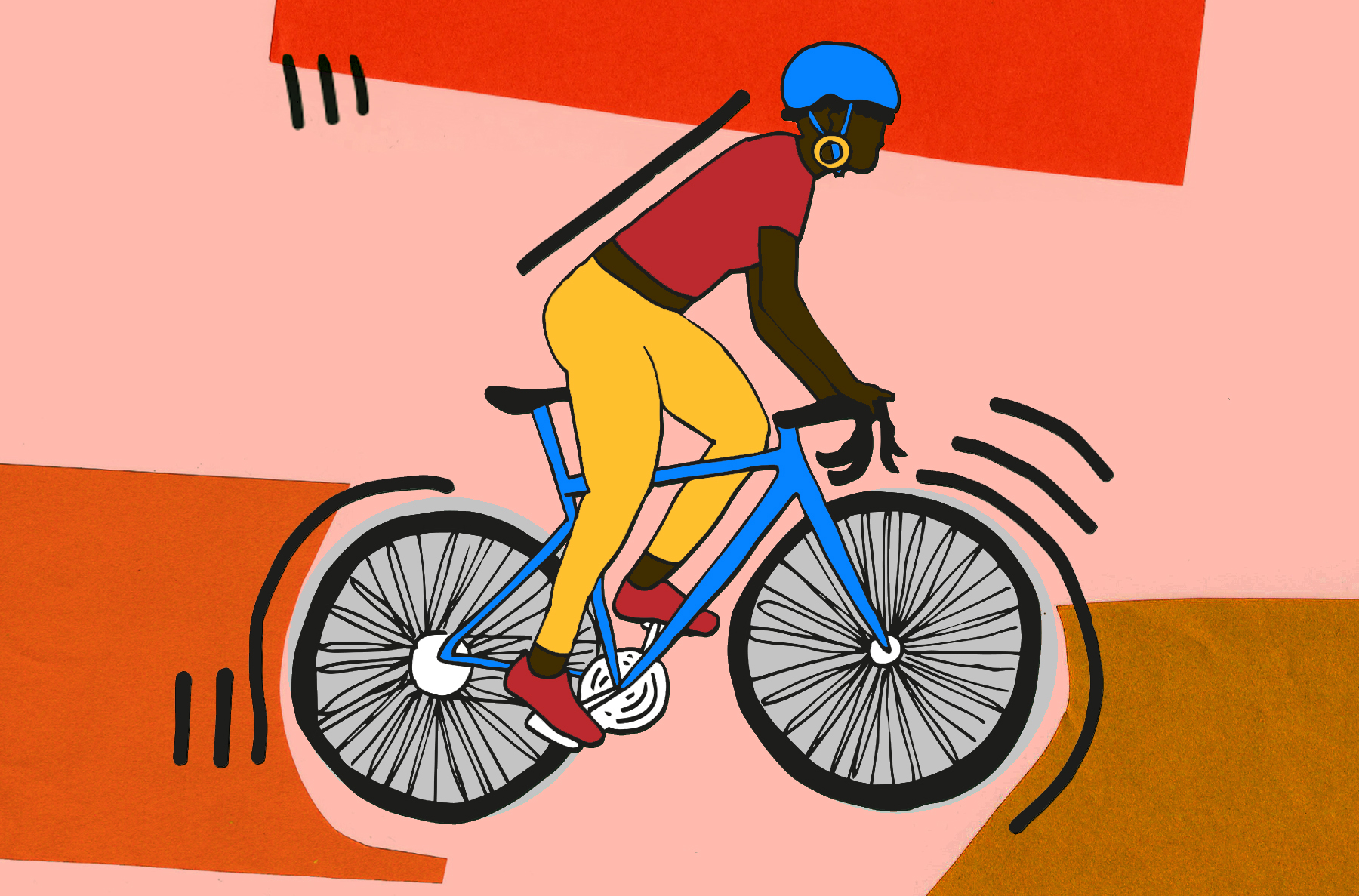
Illustration by Naomi Gennery
Having recently completed Prudential’s London to Surrey 100 mile cycling event, it was one of the proudest moments of my life, sobbing uncontrollably as I rode the last mile to the finish line. I was overwhelmed, exhausted and surprised at my achievement. I’m still genuinely shocked that I made it.
Before I begin, let me give you a brief background on my extensive cycling proficiency.
None. I have none. I haven’t sat on a bike in almost ten years, my first ever spin class was three months ago and the only childhood memory I have of riding a bike was cycling into a wall as my father attempted to teach me how to ride without stabilisers. As you can imagine, there were lots of tears and refusals to continue but as Asian fathers do, he showed no sympathy, insisted I get up and try again – so, 100 miles felt like an achievement alright.
“The event, held in London – one of the most diverse cities in the world, was dominated by middle-aged white men. Turns out there’s a name for them, “Mamils” – Middle-Aged-Men-In-Lycra”
I was astounded at the faultless organisation of the event as well as the overwhelming support of volunteers and spectators despite the painfully early start and pouring rain. However, RideLondon 2018 highlighted a bigger issue; the serious lack of gender and ethnic diversity in cycling.
The event, held in London – one of the most diverse cities in the world, was dominated by middle-aged white men; a stereotype I never anticipated to be this accurate. Turns out there’s a name for them, “Mamils” – Middle-Aged-Men-In-Lycra. Yep, that’s a real term. I was surrounded by them from the word “go”, receiving uncomfortable gazes at the start line whilst the DJ blasted songs by U2, The Monkees and The Beatles to warm up the crowd, setting the tone for the day ahead. Did I mention, I’m an intersectional South Asian woman? Lucky me.
Whilst I was continuously overtaken by a steady influx of cyclists throughout the ride, I noticed only three other women of colour throughout the entirety of my journey – one of which was my aunty who I was riding with. There were 30,000 cyclists at the event and my finishing time was a snail’s pace, so I saw a lot of people.
“As a British Indian woman in her 20s, I was glaringly aware of my presence from start to finish, especially as a novice to the cycling world”
The lack of ethnic diversity and female representation was shocking, disheartening and frankly quite intimidating. As a British Indian woman in her 20s, I was glaringly aware of my presence from start to finish, especially as a novice to the cycling world.
Turns out that the domination of white middle-class males in cycling is more than just a mere observation. 85 percent of cyclists in London are white, leaving only 15 percent of cyclists in London being black, Asian or of minority ethnicity. In addition, the male to female ratio of riders is 3:1, highlighting the lack of representation.
Delving deeper into this issue, I found myself probing the “Mamil” stereotype to find research conducted by London School of Hygiene and Tropical Medicine (LSHTM) exploring why in London “cycling is disproportionately an activity of affluent white men”. The study funded by TfL and NHS Camden highlights several influencing factors, one of which being that cycling is associated with a certain image; the gender imbalance was attributed to perceived femininity, or lack of, with one interviewee stating that “women that do cycle are probably more blokey than feminine”. My heart sank as I read this. The suffragettes – women who transcended societal boundaries to pave our future, used cycling as a mode of transport and a means of liberalisation.
Whilst I can relate to wanting to stay fashionable during my ride, having rocked an “all black everything” outfit, including those sexy biker shorts with the bum pads and a pair of pearl earrings to match, I found that I soon forgot about my appearance, concentrating on staying warm and completing the ride, which was liberating in itself.
“Whilst I can relate to wanting to stay fashionable during my ride… I found that I soon forgot about my appearance, concentrating on staying warm and completing the ride, which was liberating in itself.”
It’s not just the idea of perceived femininity but also perceived safety, or actually, just safety. And rightly so. In 2009, 10 out of 13 cycling related deaths in London were women. As Helen Pidd suggests in her article, women may be more vulnerable on the roads because they are less likely to “own” the road resulting in dangerous consequences.
Which brings me to my next point; is “owning” the lane just another term for aggression? Because aggression was also another influencing factor in cycling according to the 2011 study, with a couple of interviewees admitting to adopting an aggressive attitude as cyclists, referring to themselves as “urban warriors”. In retrospect, my personal experience supports this, having been thrown a fair few condescending and cutting remarks by passing cyclists as they overtook me, as well as other non-verbal microaggressions from these avid male cyclists on their road bikes, almost in a “Why are you even here?” way, as my hybrid bike battled the roads of London. An air of superiority was definitely made felt, knocking my confidence at times, to which I can understand why budding cyclists would be discouraged to take up the sport.
And whilst I can understand the intimidation that comes with taking on a new sport as a woman of colour, it is our duty to overcome this. Amidst all the policies and changes that the Mayor of London and TfL are implementing in encouraging diversity in cycling, it stems from getting out of our comfort zones as women, taking on new experiences – especially in sport, overthrowing stereotypes and shifting paradigms, empowering others to do the same. It’s only this way, that diversity in sport will advance. It is because of my aunty, a woman of colour, that I have been exposed to a whole new world of cycling, I attribute all my success on the ride to her, changing my life – to the extent that we’re entering to ride again next year!








